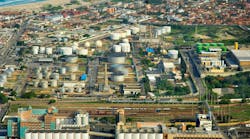Brazil’s state-owned Petroleo Brasileiro SA (Petrobras) plans next December to reduce diesel imports with the industrial scale production of H-Bio, a new form of biodiesel. H-Bio is obtained through the mixture of 10% vegetable oil with petroleum.
In 2007 Petrobras plans to use 256,000 l. of soy oil in the production of 2.56 million cu m of H-Bio fuel, Petrobras downstream director Paulo Roberto Costa said. That will replace 15% of Petrobras’s current diesel imports, estimated at 1.7 billion l. in 2006.
By 2008, diesel imports will be reduced by 25% when H-Bio production will increase to 4.25 million cu m with a demand of 425,000 l. of soy oil, Costa said.
Petrobras should see a short-term savings of $145 million/year and a medium-term savings of $240 million/year, Costa said.
H-Bio was developed in Petrobras’s research and development center (Cenpes) by a team headed by engineer Jefferson Roberto Gomes. The product, produced through a process called hydrogenation, is less polluting and more efficient than the traditional diesel, with lower sulfur and improved ignition quality.
H-Bio differs from biodiesel, which is also produced with vegetable oils but is blended into regular diesel by oil products distributors, not at the refinery level. Biodiesel is entirely vegetable-based. By 2008, it will be mixed with regular diesel at a rate of 2% but this date may be moved up to the first half of 2007, the government says.
By yearend, H-Bio will be produced at the Gabriel Passos (Regap) refinery, Minas Gerais state and, in 2007, at Presidente Getúlio Vargas (Repar) refinery, Paraná state and Alberto Pasqualini (Refap), Rio Grande do Sul state.
Petrobras invested $38 million in the three refineries to produce and stock H-Bio and will set up tenders for purchasing soy oil by November.
Brazil already produces 5.6 million cu m/year of soy oil, and this is currently the product with greatest availability for usage in H-Bio production. However, oil from other oleaginous plants, such as castor seeds, sunflower seeds, oil palm, and cotton, may also be used.

